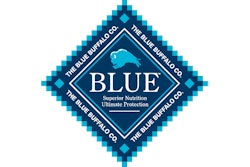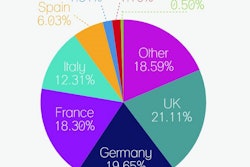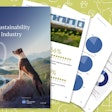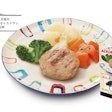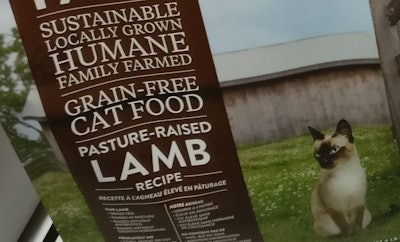
In the new product showcase of SuperZoo, the claims made on the labels of many new dog and cat foods exemplified three trends focused on ethical concerns and pet health. SuperZoo 2017, a pet industry trade show, was held in Las Vegas, Nevada, USA from July 24 to 27.
1. Clean Label not empty label
Clean label pet food seems to be a rising trend. Yet, while clean label marketing focuses on short, simple ingredient panels, the rest of the labels on some new products` contained numerous claims. These pet foods and treats boasted to be a combination of:
- grain-free, potato-free,
- high-protein, raw,
- made in the USA, no Chinese ingredients,
- meat first,
- organic, non-GMO,
- humane, cage-free, grass-fed, wild-caught, cruelty-free
- family-owned or
- high omega-3 fatty acids
For example, Open Farm's new cat food on display at SuperZoo featured these label claims: sustainable, locally grown, humane, family farmed, grain-free and pasture-raised lamb.
2. Negative versus positive claims
Many of these claims were more about what wasn’t in the new product than what was. These negative claims are nothing new, but the prevalence of positive claims may be significant.
This article is part of a Petfood Industry series that explores labeling issues.
Another article in the series:
Nearly a decade ago in Petfood Industry, David Dzanis, PhD, wrote that claims about the absence of an ingredient in a pet food may cause false disparagement of a safe and acceptable feed ingredient. That phenomenon remains. For example, grain-free remains a top claim, although much research does not support the contention that dogs should eat like wolves.
Despite this, positive claims also appeared prominently on new pet food product labels at SuperZoo. Many of them dealt with health and nutrition, such as high protein, while others told the backstory of the crops and livestock used as ingredients, such as grass-fed beef. These specific claims about animal welfare and sustainability may be ways for pet food brands to differentiate in a crowded natural dog and cat food market.
3. Ethical claims
Labeling pet foods with animal welfare claims may be particularly effective, since pet owners seem inclined to purchase products marketed using claims about animal welfare. The journal Proceedings in System Dynamics and Innovation in Food Networks published a review of scientific research on the relationship between pet ownership and opinions about livestock husbandry practices. In the review, scientists found a statistically significant correlation between pet ownership and support for animal welfare, along with a willingness to pay for meat raised in that manner.
New pet food products’ labels may be tapping into this tendency. Some of these products at SuperZoo included a puppy formula from Stella and Chewy’s that features cage-free chicken, and pasture-raised lamb in a Blue Buffalo product.
Similarly, environmental and sustainability claims may appeal to pet owners who desire to know that their purchases benefit others and meet ethical standards. New products from Scout and Zoe's and BareItAll featured Asian carp, fish that have invaded American waterways and threaten commercial fishers’ livelihoods. Asian carp pet treats remove non-native species while boosting US economies.
One company combined the two ideas and offered invasive species that lived in humane conditions. Artvark Pet Products introduced a venison jerky made from non-native deer on the Hawaiian islands. Since there are no native predators, the company claims each deer leads a “stressless” life until a hunter’s bullet ends it quickly.
Considered together, the ethical and nutritional claims made on new pet food products’ labels at SuperZoo continue to focus on trends that started in the human foods.





